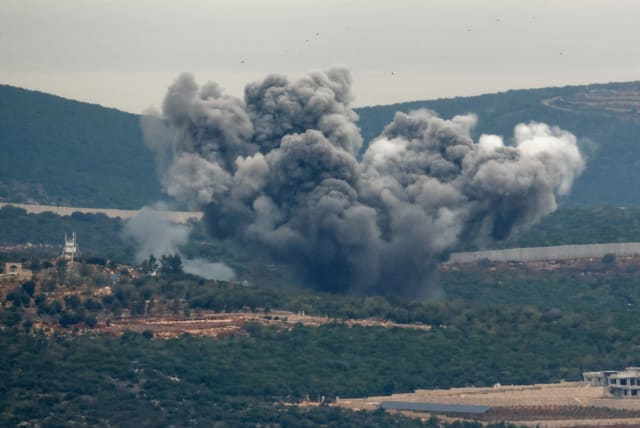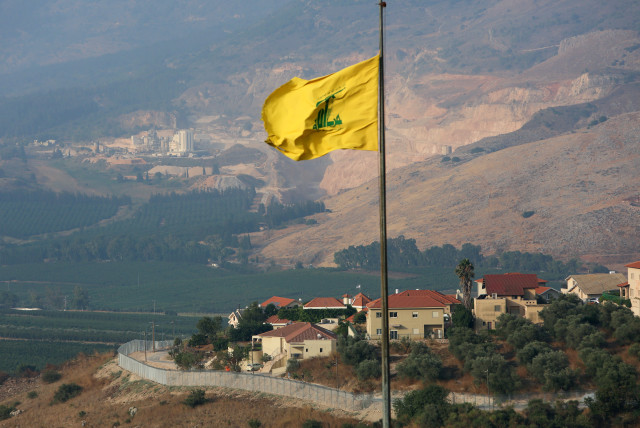Israeli expert: With Hezbollah, political solution not in sight, full-scale war possible

Col. (res.) Miri Eisin: "Hezbollah has far greater military capabilities than Hamas does, and while Israel is prepared and can deal with the threat, the challenge is 'very big.'"
Col. (res.) Miri Eisin is the managing director of the International Institute for Counter-Terrorism at Reichman University in central Israel. An expert in geopolitics and regional security, she served in Israeli intelligence for many years and worked for the Prime Minister's Office as an international media adviser during the Second Lebanon War. Eisin spoke to The Media Line about the risk of an all-out war between Israel and Hezbollah.
TML: How do you read what has been happening between Israel and Hezbollah since the war started?
Col. (res.) Miri Eisin: Hezbollah is trying to act as if they are definitely helping out Hamas in the Gaza Strip, and at the same time, Hezbollah is very wary of the Israeli focus being against Hezbollah. It's trying to hold both sides of the sword in its own way, semi-successfully.
Hezbollah has managed to create a de facto buffer zone on the Israeli side because of its actions against Israeli communities along the border.
Israel preemptively evacuated over two dozen communities. Having said that, Hezbollah is continuously firing into Israel, has been attacked consistently by Israel, and is having a lot of casualties in Lebanon, as they continue to use their diverse arsenal of weapons.
TML: Do you believe that it is possible to get to a diplomatic agreement in which Hezbollah would retreat and go north to the Litani River?
Col. (res.) Miri Eisin: I do not. I understand the idea, but I don’t think that there is any force that is going to the military force of Hezbollah to move. I don’t believe in Hezbollah, so even if they say that they’re willing to do so, and I don't think that they will, I don’t believe it. Who will follow and implement that? And because of that, I think that the diplomatic idea is lovely, but it’s totally impractical.
TML: If, one way or another, Hezbollah does go north to the Litani River, is the Israeli northern community safe because of that?
Col. (res.) Miri Eisin: Hezbollah forces, specifically the Radwan Force, are much stronger and have many more weapons, capabilities, and training than what we saw in the attack on Israel by Hamas on Oct. 7.
If the Radwan Force goes north from the Litani River, that is a significant event. If there is some kind of diplomatic pressure that would make Iran tell Hezbollah to go to the north of the river, that is significant.
I do think that Israeli communities all along the border would feel much safer. It’s not the only thing that would have to be done. But that’s the main direct threatening force on the border communities.
TML: What is the possibility of an all-out war erupting? And what are the main considerations taken by both Israel and Hezbollah before starting a war?
Col. (res.) Miri Eisin: Every single day we need to be aware that, both because of miscalculation or also because of the targeting itself that Hezbollah is doing into the state of Israel, a full-scale war could break out.
To be clear, right now, we are at war with Hezbollah. It is a war of attrition. It is localized in most of the buffer zone. For it to be full-scale, with Hezbollah using the immense amount of weaponry it has, it could be because it has launched a successful attack on Israel. We have been exceedingly good at preventing all of these incoming attacks, with very few casualties inside Israel until now.
It could be a miscalculation when Israel responds against all of these Hezbollah attacks that have been taking place against Israel. If Israel responds inadvertently and there is a large number of casualties on the Lebanese side, Hezbollah could decide to do a full-scale attack.
Add to that that Hezbollah is an Iranian proxy. If Iran changes its tune, if it thinks that it’s not enough to use Houthis in Yemen, or the different Iraqi Shia proxy groups, or other Syrian proxy groups, and wants to expand its powers, that can also bring about full-scale war.
I don’t see Israel doing right now a preemptive full-scale attack against all of Hezbollah's capabilities. But to be clear, we are attacking them daily, both along the border and deeper inside.
TML: Can you speak about Hezbollah’s military capabilities?
Col. (res.) Miri Eisin: Everything that we saw from Hamas, pretty much times 10. Everything that we saw from Hamas, with more training, and with more very high-tech weapons.
We knew what Hamas had. Most of our problem was that we did not assess that they would use it.
When we are talking about Hezbollah and their Radwan Force, [it has] thousands of trained operators who have been trained physically in Iran, know how to use all their weapons, [and] own motorcycles. They have been trained to operate above ground, below ground. [They have] capabilities of attacking communities.
The weapons themselves: anti-tank guided missiles, suicide drones, a wide variety of UAVs [unmanned aerial vehicles] with gathering capabilities, and a very big variety of rockets and missiles, including exact guided missiles.
All of these are capabilities that we may have seen singularly from Hamas, but when it comes to Hezbollah, they have all of these weapons in mass. If Hamas has 15,000 rockets, Hezbollah has 150,000 rockets.
TML: How prepared is Israel to deal with that threat?
Col. (res.) Miri Eisin: When you take these numbers in, it is a very big challenge. Israel can withstand it and attack it, but it doesn’t mean that you do it without any casualties within Israel and without any successes to Hezbollah.
It is a very big challenge that we’ve been aware of for over a decade in its presence.
Hezbollah’s capabilities are what Israel was preparing itself for. Part of the reason that we missed Hamas is that Israel has been preparing to take out Hezbollah’s capabilities. For many years, Israel has preemptively attacked different Hezbollah targets, mainly in Syria and slightly inside Lebanon.
To do an all-out preemptive strike, Israel has the capabilities. It means attacking dozens if not hundreds of targets simultaneously from the air and the ground—all the Hezbollah weaponry cache of weapons.
Where are all of these weaponry and operatives? Inside towns and villages and cities, both in southern Lebanon and the city of Beirut, [and] in the Beqaa Valley [in eastern Lebanon].
Everything that we are seeing in that sense, all the challenges of civilian populations where Hezbollah lives within that civilian population, would exist in any kind of an attack against Hezbollah inside Lebanon.
We already see it on a small scale now, as we are doing targeted attacks against different Hezbollah terrorists in different towns and villages. We have mainly been very targeted, only killing Hezbollah operatives. But even in these last two and a half months, we have killed a civilian here, a civilian there. It would be on a much larger scale.
TML: What is the position of the rest of the Lebanese leadership?
Col. (res.) Miri Eisin: Lebanon is a complex country. It’s made up of a variety of minorities. Lebanon has not had a census and demographic count of how many people there are and the different minorities since 1932.
Why am I giving that historical fact? Because there’s no question that the Arabic-speaking Shiites of Lebanon, which Hezbollah is one of their political parties—politics done by a terror organization—are probably over 50% of the population. So, when we talk about all the other Lebanese, they are most likely together around 50% of the population. That includes Sunni Arabic-speaking Muslims, Druze, and Alawites, and also includes a large Christian population with a variety of denominations.
I don’t have expectations of Lebanon the country. All the diplomacy is done with Lebanon the country, and that’s why it’s such a big question. What do you do when a hybrid terror organization is both part of the population, participates in the political process, and has the eighth-largest cache of weapons in the world?
Lebanon is a country of almost 10 million people that hosts an enormous number of refugees from the Syrian war and Palestinian refugees from 1948.
TML: How would a war affect Lebanon as a country, specifically given that the country is already economically collapsed?
Col. (res.) Miri Eisin: The country itself used to have a very sustainable economy. That economy fell apart over the last four to five years and took a dive over the last two years, not connected to Israel, to the war, or the Palestinian issue. This is about the domestic Lebanese running of government. With corruption, and very big challenges within the country itself, Lebanon cannot sustain a war.
On the Lebanese side, mainly Christian communities on the Lebanese side of the border have evacuated or displaced people.
In the 2006 war, Israel chose to target, very much so, a lot of the infrastructure of Lebanon. We hold that country responsible for what grows within it. Having said that, we may do that again. But in this country, Lebanon the government does not know how to contain Hezbollah the terror organization in itself.
There is no easy resolution for [the fact] that it will be hurt, and their economy will be hurt even worse. I would even say it’s hurting now because of the war here as a side effect. But having said all of that, if the Lebanese do not take care of Hezbollah, I don’t think that the international community will take care of it. It means that Israel will, and [if] Israel does that, that is only through the use of our military capability againstHezbollah's terror capability, which, as I’ve said, is throughout Lebanon, in towns, villages, and cities. That’s where we will be attacked [from].
Hezbollah is a hybrid terror organization. For those of you who see Hezbollah as being something that gives back to the Lebanese Shiite community, a terror organization that also does charity, a terror organization that is into education … [it] is first and foremost a terrorist organization. Don’t forget that.
Jerusalem Post Store
`; document.getElementById("linkPremium").innerHTML = cont; var divWithLink = document.getElementById("premium-link"); if (divWithLink !== null && divWithLink !== 'undefined') { divWithLink.style.border = "solid 1px #cb0f3e"; divWithLink.style.textAlign = "center"; divWithLink.style.marginBottom = "15px"; divWithLink.style.marginTop = "15px"; divWithLink.style.width = "100%"; divWithLink.style.backgroundColor = "#122952"; divWithLink.style.color = "#ffffff"; divWithLink.style.lineHeight = "1.5"; } } (function (v, i) { });

